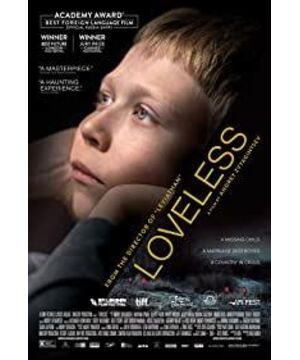The story of the film couldn't be simpler. Such stories have become commonplace in film and television dramas over the past few decades or in real life. Both husband and wife have new love and divorce, and children have become the biggest burden. Changed to a domestic TV series, it is estimated that it will take at least 45 episodes to tell how the husband and wife torture each other in a loveless marriage, and to explain in detail the ins and outs of the new love of the two parties. How tormented in the family, plus some troubles at school, then the child ran away, the husband and wife panicked, complained to each other, mobilized neighbors, relatives and friends, the police and enthusiastic group owners to find the child, and finally was left out in Internet cafes or in the countryside. The grandparents or the grandparents found it at home. Through such an event, the couple realize that the child is everything to them, so they feel that they are reunited or one party (usually the mother) decides to take the child, and finally it ends happily. Putting such a story into a nearly two-hour movie is totally fine, but the matter is more compact, the explanation of multiple events can be realized by cutting, and the process of finding children is more urgent, and parents need to express More anxious, more frequent camera switching, more rapid music, etc. The purpose is to let their emotions infect the audience through the screen and resonate, which may be generally what we see or basically acceptable to us psychologically. This kind of themed film and television drama is a kind of situation. However, Sarkinsev did not deal with it in this way in "No Love to Complain". He just forbears when his emotions need to explode. For example, after the two sides found out that the child was missing, although the wife called her husband, they also abused each other. Then I thought that if the child was wandering around, he would go home in a while, but later found that there was no progress, and the two sides did not express excessive anxiety and uneasiness. In domestic film and television dramas, it is necessary to show that as a parent, it is inevitable to have insomnia. And there are also passages where the mother washes her face in tears, and the husband and wife quarrel hysterically, etc., and Sarkinsev treats it coldly, hiding the due emotional expression that people agree on, and replacing it with restraint and calmness. I have to say that Bresson and others have a bad head, but all works that are going to win awards at the film festival are created in this direction, such as reducing dialogue, slowing down verbal responses, slowing down actions, restraining emotions, and weeping instead of crying. , the film tone removes strong emotions, and there is a must-have long shot. Looking at the masters and their good films in the hearts of movie fans, most of them have several or all of the above elements. It does not mean that all films should not be treated in this way, but whether it is necessary for a relatively vulgar story like "No Love to Tell"? So pretending to be deeply restrained and restrained, if you want to restrain yourself, you can , but he used it in the wrong direction. As for the issues of marriage, mother-son or father-son, mother-daughter, religion and politics (if any) that the director is going to discuss, I don't see what is special about it and what we understand, what are the more acute points to present to us, A lot of space is devoted to how a non-profit search and rescue organization spares no effort to search and rescue missing children, is it to insinuate the bureaucracy and inaction of the government? I don’t think so, because the police in the film who are responsible for filing the disappearance of children have clearly advised them to seek help from a more efficient search and rescue organization. If the director wants to criticize and criticize the government, he needs to make things so straightforward, so unskilled? ? I don't think the director of this film has made the film and politics too involved like his last film "Leviathan", although I admit that the focus of the search and rescue team has this meaning, and the latter is too deliberate , Discordant news broadcasts, but the director is more on human emotions, human love for themselves, that is, the pursuit of any emotion that can bring pleasure to itself (lust is more primitive and strong among all emotions ), it surpasses other emotions, including his own children. However, the director’s handling this time is a little clumsy. Although the lengthy search and rescue makes the film different from ordinary film and television dramas, it only makes it more dull in form and looks more It's just literature and art. In response to their emotional abandonment of their children, crying behind the door of the child in front, weeping at breakfast, and running away from home, this series of events is enough to serve this theme. I personally feel that the final process of finding the child can be left to them Continuing the sub-background under the main background of life, and letting this sub-line gradually disappear, can make the audience reflect on the nature of human emotions from the side. As for the theme of lovelessness, it is also reflected in several ways of getting rid of it. One is the tension between the heroine and her mother. She married the hero in order to get rid of her mother. For the same reason, she gave birth to a child she did not want. ; Later, in order to get rid of the male protagonist, he chose a balding, warm-hearted new boyfriend, the teasing under the restaurant table, the tenderness on his boyfriend's bed, as if he had found the happiness once and for all; the male protagonist wanted to get rid of the female protagonist. And made other people's stomachs bigger; after that, the husband and wife wanted to get rid of their children for their new love, and God finally cruelly granted their wishes. Then the next cycle started again. The male protagonist couldn't stand the child throwing toys around while he was watching TV in the new family, and put the child rudely in the small fence and let it cry; She sat blankly at the original home while brushing her mobile phone, and then ran silently on the outdoor treadmill without saying a word... If there is any) problem, I don't see what is special about it and what we understand, what more acute points should be presented to us, and there is still a lot of space on how a non-profit search and rescue organization spares no effort to search and rescue missing persons Are you kidding me to insinuate the bureaucracy and inaction of the government? I don’t think so, because the police in the film who are responsible for filing the disappearance of children have clearly advised them to seek help from a more efficient search and rescue organization. If the director wants to criticize and criticize the government, he needs to make things so straightforward, so unskilled? ? I don't think the director of this film has made the film and politics too involved like his last film "Leviathan", although I admit that the focus of the search and rescue team has this meaning, and the latter is too deliberate , Discordant news broadcasts, but the director is more on human emotions, human love for themselves, that is, the pursuit of any emotion that can bring pleasure to itself (lust is more primitive and strong among all emotions ), it surpasses other emotions, including his own children. However, the director’s handling this time is a little clumsy. Although the lengthy search and rescue makes the film different from ordinary film and television dramas, it only makes it more dull in form and looks more It's just literature and art. In response to their emotional abandonment of their children, crying behind the door of the child in front, weeping at breakfast, and running away from home, this series of events is enough to serve this theme. I personally feel that the final process of finding the child can be left to them Continuing the sub-background under the main background of life, and letting this sub-line gradually disappear, can make the audience reflect on the nature of human emotions from the side. As for the theme of lovelessness, it is also reflected in several ways of getting rid of it. One is the tension between the heroine and her mother. She married the hero in order to get rid of her mother. For the same reason, she gave birth to a child she did not want. ; Later, in order to get rid of the male protagonist, he chose a balding, warm-hearted new boyfriend, the teasing under the restaurant table, the tenderness on his boyfriend's bed, as if he had found the happiness once and for all; the male protagonist wanted to get rid of the female protagonist. And made other people's stomachs bigger; after that, the husband and wife wanted to get rid of their children for their new love, and God finally cruelly granted their wishes. Then the next cycle started again. The male protagonist couldn't stand the child throwing toys around while he was watching TV in the new family, and put the child rudely in the small fence and let it cry; She sat blankly at the original home while brushing her mobile phone, and then ran silently on the outdoor treadmill without saying a word... If there is any) problem, I don't see what is special about it and what we understand, what more acute points should be presented to us, and there is still a lot of space on how a non-profit search and rescue organization spares no effort to search and rescue missing persons Are you kidding me to insinuate the bureaucracy and inaction of the government? I don’t think so, because the police in the film who are responsible for filing the disappearance of children have clearly advised them to seek help from a more efficient search and rescue organization. If the director wants to criticize and criticize the government, he needs to make things so straightforward, so unskilled? ? I don't think the director of this film has made the film and politics too involved like his last film "Leviathan", although I admit that the focus of the search and rescue team has this meaning, and the latter is too deliberate , Discordant news broadcasts, but the director is more on human emotions, human love for themselves, that is, the pursuit of any emotion that can bring pleasure to itself (lust is more primitive and strong among all emotions ), it surpasses other emotions, including his own children. However, the director’s handling this time is a little clumsy. Although the lengthy search and rescue makes the film different from ordinary film and television dramas, it only makes it more dull in form and looks more It's just literature and art. In response to their emotional abandonment of their children, crying behind the door of the child in front, weeping at breakfast, and running away from home, this series of events is enough to serve this theme. I personally feel that the final process of finding the child can be left to them Continuing the sub-background under the main background of life, and letting this sub-line gradually disappear, can make the audience reflect on the nature of human emotions from the side. As for the theme of lovelessness, it is also reflected in several ways of getting rid of it. One is the tension between the heroine and her mother. She married the hero in order to get rid of her mother. For the same reason, she gave birth to a child she did not want. ; Later, in order to get rid of the male protagonist, he chose a balding, warm-hearted new boyfriend, the teasing under the restaurant table, the tenderness on his boyfriend's bed, as if he had found the happiness once and for all; the male protagonist wanted to get rid of the female protagonist. And made other people's stomachs bigger; after that, the husband and wife wanted to get rid of their children for their new love, and God finally cruelly granted their wishes. Then the next cycle started again. The male protagonist couldn't stand the child throwing toys around while he was watching TV in the new family, and put the child rudely in the small fence and let it cry; She sat blankly at the original home while brushing her mobile phone, and then ran silently on the outdoor treadmill without saying a word... Child, are you trying to insinuate the bureaucracy and inaction of the government? I don’t think so, because the police in the film who are responsible for filing the disappearance of children have clearly advised them to seek help from a more efficient search and rescue organization. If the director wants to criticize and criticize the government, he needs to make things so straightforward, so unskilled? ? I don't think the director of this film has made the film and politics too involved like his last film "Leviathan", although I admit that the focus of the search and rescue team has this meaning, and the latter is too deliberate , Discordant news broadcasts, but the director is more on human emotions, human love for themselves, that is, the pursuit of any emotion that can bring pleasure to itself (lust is more primitive and strong among all emotions ), it surpasses other emotions, including his own children. However, the director’s handling this time is a little clumsy. Although the lengthy search and rescue makes the film different from ordinary film and television dramas, it only makes it more dull in form and looks more It's just literature and art. In response to their emotional abandonment of their children, crying behind the door of the child in front, weeping at breakfast, and running away from home, this series of events is enough to serve this theme. I personally feel that the final process of finding the child can be left to them Continuing the sub-background under the main background of life, and letting this sub-line gradually disappear, can make the audience reflect on the nature of human emotions from the side. As for the theme of lovelessness, it is also reflected in several ways of getting rid of it. One is the tension between the heroine and her mother. She married the hero in order to get rid of her mother. For the same reason, she gave birth to a child she did not want. ; Later, in order to get rid of the male protagonist, he chose a balding, warm-hearted new boyfriend, the teasing under the restaurant table, the tenderness on his boyfriend's bed, as if he had found the happiness once and for all; the male protagonist wanted to get rid of the female protagonist. And made other people's stomachs bigger; after that, the husband and wife wanted to get rid of their children for their new love, and God finally cruelly granted their wishes. Then the next cycle started again. The male protagonist couldn't stand the child throwing toys around while he was watching TV in the new family, and put the child rudely in the small fence and let it cry; She sat blankly at the original home while brushing her mobile phone, and then ran silently on the outdoor treadmill without saying a word... Child, are you trying to insinuate the bureaucracy and inaction of the government? I don’t think so, because the police in the film who are responsible for reporting the disappearance of children have clearly advised them to seek help from a more efficient search and rescue organization. If the director wants to criticize and criticize the government, he needs to make things so straightforward, so unskilled? ? I don't think the director of this film has made the film and politics too involved like his last film "Leviathan", although I admit that the focus of the search and rescue team has this meaning, and the latter is too deliberate , Discordant news broadcasts, but the director is more on human emotions, human love for themselves, that is, the pursuit of any emotion that can bring pleasure to itself (lust is more primitive and strong among all emotions ), it surpasses other emotions, including his own children. However, the director’s handling this time is a little clumsy. Although the lengthy search and rescue makes the film different from ordinary film and television dramas, it only makes it more dull in form and looks more It's just literature and art. In response to their emotional abandonment of their children, crying behind the door of the child in front, weeping at breakfast, and running away from home, this series of events is enough to serve this theme. Continuing the sub-background under the main background of life, and letting this sub-line gradually disappear, can make the audience reflect on the nature of human emotions from the side. As for the theme of lovelessness, it is also reflected in several ways of getting rid of it. One is the tension between the heroine and her mother. She married the hero in order to get rid of her mother. For the same reason, she gave birth to a child she did not want. ; Later, in order to get rid of the male protagonist, he chose a balding, warm-hearted new boyfriend, the teasing under the restaurant table, the tenderness on his boyfriend's bed, as if he had found the happiness once and for all; the male protagonist wanted to get rid of the female protagonist. And made other people's stomachs bigger; after that, the husband and wife wanted to get rid of their children for their new love, and God finally cruelly granted their wishes. Then the next cycle started again. The male protagonist couldn't stand the child throwing toys around while he was watching TV in the new family, and put the child rudely in the small fence and let it cry; She sat blankly at the original home while brushing her mobile phone, and then ran silently on the outdoor treadmill without saying a word... The focus of the film has this meaning, as well as the news broadcasts that are too deliberate and discordant, but the director focuses more on human emotions, the love of human beings for themselves, that is, the pursuit of anything that can give them Brings pleasant emotions (lust is more primitive and strong of all emotions), it is more than other emotions, including for one's own children, but this time the director's handling is a little clumsy, and the lengthy search and rescue makes the film different from ordinary Movies and TV dramas, but it only makes it more dull in form and looks more literary. In response to their emotional abandonment of their children, crying behind the door of the children in front, tears at breakfast, and running away from home, this series of incidents is enough. Serving this theme, I personally feel that the final process of finding children can be placed in the sub-background of the main background of their continued life, and letting this sub-line gradually disappear, which can make the audience reflect on the nature of human emotions from the side. As for the theme of lovelessness, it is also reflected in several ways of getting rid of it. One is the tension between the heroine and her mother. She married the hero in order to get rid of her mother. For the same reason, she gave birth to a child she did not want. ; Later, in order to get rid of the male protagonist, he chose a balding, warm-hearted new boyfriend, the teasing under the restaurant table, the tenderness on his boyfriend's bed, as if he had found the happiness once and for all; the male protagonist wanted to get rid of the female protagonist. And made other people's stomachs bigger; after that, the husband and wife wanted to get rid of their children for their new love, and God finally cruelly granted their wishes. Then the next cycle started again. The male protagonist couldn't stand the child throwing toys around while he was watching TV in the new family, and put the child rudely in the small fence and let it cry; She sat blankly at the original home while brushing her mobile phone, and then ran silently on the outdoor treadmill without saying a word... The focus of the film has this meaning, as well as the news broadcasts that are too deliberate and discordant, but the director focuses more on human emotions, the love of human beings for themselves, that is, the pursuit of anything that can give them Brings joyful emotions (lust is more primitive and strong of all emotions), it surpasses other emotions, including for one's own children, but this time the director's handling is a bit clumsy, and the lengthy search and rescue makes the film different from ordinary Movies and TV dramas, but it only makes it more dull in form and looks more literary. In response to their emotional abandonment of their children, crying behind the door of the children in front, tears at breakfast, and running away from home, this series of incidents is enough. Serving this theme, I personally feel that the final process of finding children can be placed in the sub-background of the main background of their continued life, and letting this sub-line gradually disappear, which can make the audience reflect on the nature of human emotions from the side. As for the theme of lovelessness, it is also reflected in several ways of getting rid of it. One is the tension between the heroine and her mother. She married the hero in order to get rid of her mother. For the same reason, she gave birth to a child she did not want. ; Later, in order to get rid of the male protagonist, he chose a balding, warm-hearted new boyfriend, the teasing under the restaurant table, the tenderness on his boyfriend's bed, as if he had found the happiness once and for all; the male protagonist wanted to get rid of the female protagonist. And made other people's stomachs bigger; after that, the husband and wife wanted to get rid of their children for their new love, and God finally cruelly granted their wishes. Then the next cycle started again. The male protagonist couldn't stand the child throwing toys around while he was watching TV in the new family, and put the child rudely in the small fence and let it cry; She sat blankly at the original home while brushing her mobile phone, and then ran silently on the outdoor treadmill without saying a word... This theme is also reflected in several escapes. One is the tension between the heroine and her mother. She married the hero just to get rid of her mother. For the same reason, she gave birth to an unwanted child; Get rid of the male protagonist, and choose a bald and warm-looking new boyfriend, the teasing under the hotel table, the tenderness on the boyfriend's bed, and the happiness once and for all seems to have been cleared; After the husband and wife wanted to get rid of the child for their new love, God finally gave their wish cruelly. Then the next cycle started again. The male protagonist couldn't stand the child throwing toys around while he was watching TV in the new family, and put the child rudely in the small fence and let it cry; She sat blankly at the original home while brushing her mobile phone, and then ran silently on the outdoor treadmill without saying a word... This theme is also reflected in several escapes. One is the tension between the heroine and her mother. She married the hero just to get rid of her mother. For the same reason, she gave birth to an unwanted child; Get rid of the male protagonist, and choose a bald and warm-looking new boyfriend, the teasing under the hotel table, the tenderness on the boyfriend's bed, and the happiness once and for all seems to have been cleared; After the husband and wife wanted to get rid of the child for their new love, God finally gave their wish cruelly. Then the next cycle started again. The male protagonist couldn't stand the child throwing toys around while he was watching TV in the new family, and put the child rudely in the small fence and let it cry; She sat blankly at the original home while brushing her mobile phone, and then ran silently on the outdoor treadmill without saying a word...
View more about Loveless reviews









